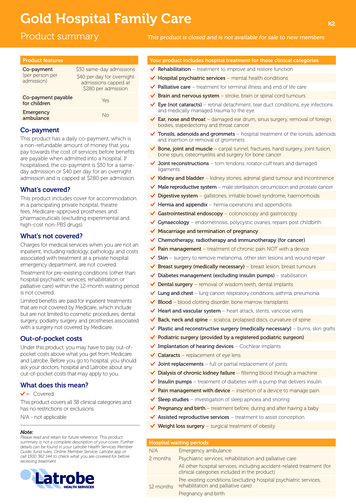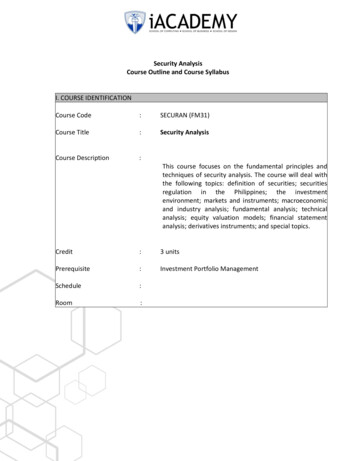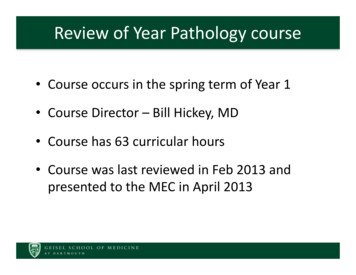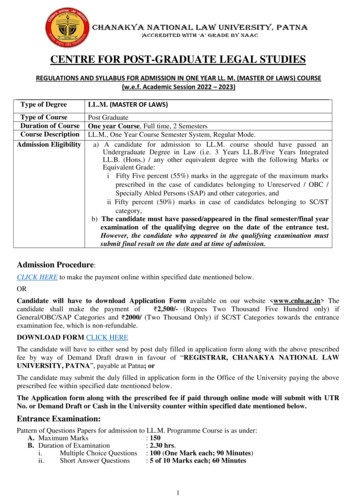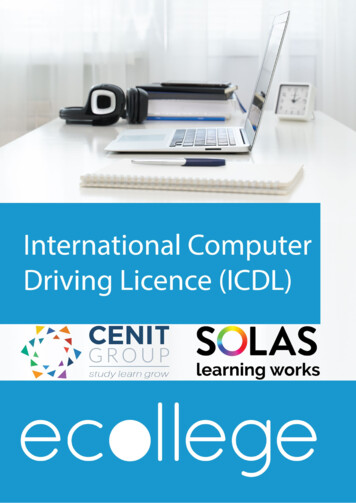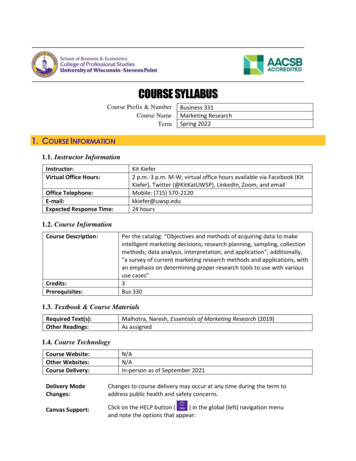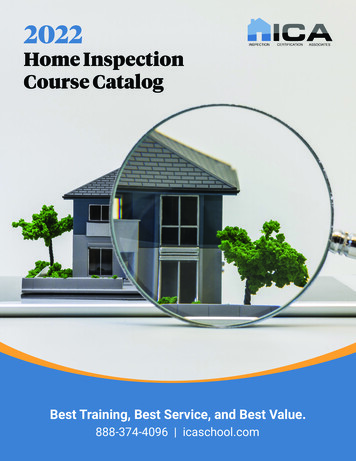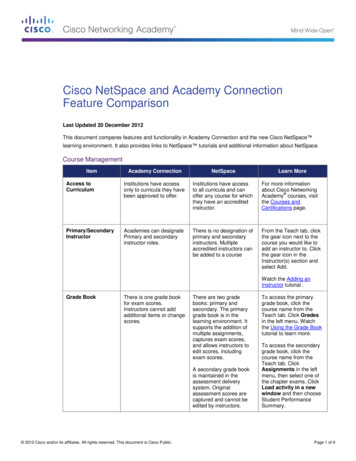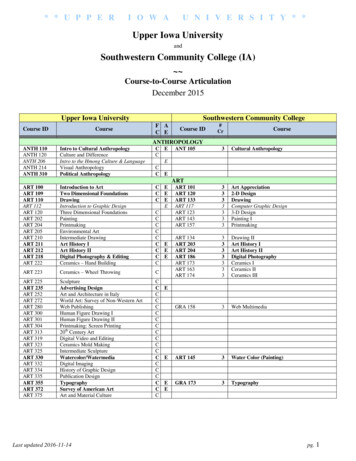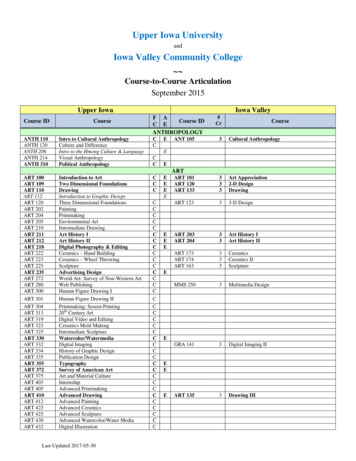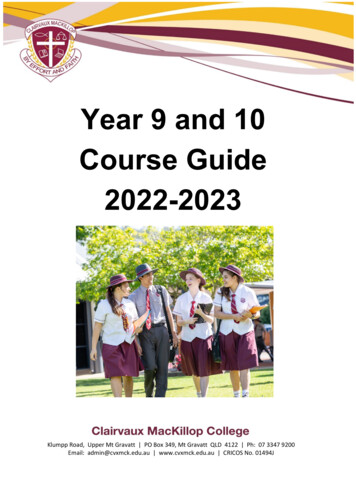
Transcription
Year 9 and 10Course Guide2022-2023Klumpp Road, Upper Mt Gravatt PO Box 349, Mt Gravatt QLD 4122 Ph: 07 3347 9200Email: admin@cvxmck.edu.au www.cvxmck.edu.au CRICOS No. 01494J
TABLE OF CONTENTSFrom Our Principal .4COURSE STRUCTURE .5Year 11 Subject Recommendations .7QUEENSLAND ATAR .10The Structure of Learning in Years 11-12 .11YEAR 9 SUBJECT OUTLINES .12Year 9 Business.13Year 9 Chinese – Semester 1 .14Year 9 Chinese Semester 2 .15Year 9 Dance – Option 1 .16Year 9 Dance - Option 2 .17Year 9 Design .18Year 9 Design and Technologies Food and Fibre Production .19Year 9 Design and Technologies Food and Fibre Production – Designing Material Solutions . 20Year 9 Design and Technologies Materials and Technologies .21Year 9 Digital Technologies .22Year 9 Drama – Option 1 .23Year 9 Drama - Option 2 .24Year 9 English .25Year 9 Geography.26Year 9 Health and Physical Education .27Year 9 History .28Year 9 Japanese – Semester 1 .29Year 9 Japanese - Semester 2 .30Year 9 Mathematics .31Year 9 Media .33Year 9 Music – Option 1 .34Year 9 Music - Option 2 .35Year 9 Religious Education .36Year 9 Science .37Year 9 STEM .38Year 9 Visual Art – Option 1.39Year 9 Visual Art – Option 2.402
YEAR 10 SUBJECT OUTLINES .41Year 10 Business.42Year 10 Chinese.42Year 10 Dance.42Year 10 Design and Technologies Food and Fibre Production.42Year 10 Design .42Year 10 Digital Technology .42Year 10 Drama .42Year 10 Engineering .42Year 10 English .42Year 10 Geography.42Year 10 Preparation for Senior Physical Education.42Year 10 Preparation for Senior Health .42Year 10 History .42Year 10 Hospitality .42Year 10 Design and Technologies Materials and Technologies .42Year 10 Japanese .42Year 10 Media .42Year 10 Music .42Year 10 Preparation for Essential English .42Year 10 Preparation for Essential Mathematics .42Year 10 Preparation for General Mathematics .42Year 10 Preparation for Mathematical Methods .42Year 10 Preparation for General Sciences.42Year 10 Preparation for Science in Practice .42Year 10 Religious Education .42Year 10 STEM .42Year 10 Visual Art .423
CLAIRVAUX MACKILLOP COLLEGEFrom Our PrincipalWhat a great moment in time – the step from Year 8 into the world of learning possibilities that areopen to our students of Years 9 and 10!Some parts of your coursework for the next two years are decided for you. They are the core aspects ofAustralian Curriculum that all students are mandated to study.You also have some choices to make. Think of these, not so much as life-changing choices, but more aslife-giving choices. Irresistible possibilities for learning and exploring and discovering. Opportunities towiden your interests and deepen your learning. Your choices now will not dictate your life’s destiny.Many varied pathways lie ahead of you and there are many varied ways of taking those pathways.Choose with the following in mind: What subjects would I really look forward to going to everyday? What subjects do I really want to explore? The interesting ones? The ones I’m curious about? Theones I would love to have a go at? What subjects will challenge me enough to keep me stretching me and challenging me enough forme to be really proud of what I achieve? What am I already pretty good at that I would like to continue?Read and listen to all of the information available to help you make your decisions. Make decisions andstick with them. Give Years 9 and 10 your very best effort. You will be well prepared for what comesnext in your school years and in your life. You will be successful.By Effort and Faith.Christine ClarkePrincipal4
COURSE STRUCTUREThe Year 9 to 10 Curriculum allows students to choose an individualised pathway through to their senior schoolyears.Students in Year 9 study six core subjects of Religious Education, English, Mathematics, Science, History, andHealth and Physical Education. Semester units in non-core elective subjects are generally available in eachsemester in Year 9.Students need to be aware that it is recommended that if they wish to study a language in years 11 to 12, theyshould choose it in years 9-10 also.YEAR 9 CORE cienceHealth and Physical EducationHistoryFull YearFull YearFull YearFull YearFull YearFull YearSUBJECT CODEREENGMATSCIHPEHISYEAR 9 ELECTIVE SUBJECTSYear 9 students will study four electives - two per semester.SUBJECTChineseDanceDigital TechnologiesDesign Technologies (Graphics)Design and Technologies (Food and Fibre Production)Design and Technologies (Materials and Technologies)DramaEconomics and BusinessGeographyJapaneseMediaMusicScience, Technology, Engineering and MathematicsVisual SemesterSemesterSemesterSUBJECT TS/VARTSC2Towards the middle Year 9, students start looking at their pathway into their senior years of schooling. Theywill study Core subjects and select Preparatory core subjects and elective subjects that they are hoping tocontinue into Years 11 and 12 while keeping in line with the Australian Curriculum nominal hours. Studentsneed to be aware of recommended subjects to Year 11 and 12 courses of study.In years 11 and 12, students have choices between General, Applied and Certificate subjects; the subjects theychoose in Year 10 are in preparation for these.5
Students must choose whether they would like to apply for university directly at the end of Year 12 or whetherthey would like to take another pathway. If a student is undecided, we can guide them on keeping their optionsopen.For a student to apply to university they would ensure they are ATAR (Australian Tertiary Entrance Rank)eligible. To ensure this, they would choose General Preparatory Core subjects.YEAR 10 CORE SUBJECTSReligionHistorySUBJECTDURATIONFull YearFull YearSUBJECT CODE10RE10HISYEAR 10 PREPARATORY CORE ential English(10ESS)EssentialMathematics(10EMA)Science inPractice(10SCIC2)DURATIONOne YearFull YearFull YearGENERALGeneral English(10ENG)GeneralMathematics(10GMA)General Science(10SCI)DURATIONATARDURATIONFull YearMathematicalMethods(10MAM)Full YearFull YearFull YearYEAR 10 ELECTIVE SUBJECTSSUBJECTDesign TechnologiesDesign and Technologies (Food and Fibre Production)Design and Technologies (Materials and Technologies)Digital ographyHospitalityMediaJapaneseMusicVisual ArtsScience, Technology, Engineering and MathematicsPreparation for Senior HealthPreparation for Senior Physical EducationDURATIONSUBJECT CODEFull YearFull YearFull YearFull YearFull YearFull YearFull YearFull YearFull YearFull YearFull YearFull YearFull YearFull YearFull YearFull YearFull 2IMPORTANT NOTE TO STUDENTS: Students wishing to study Chinese or Japanese in Years 10-12 need to complete both semesters in Year 9. Students must achieve and maintain a B in both Mathematics and Science to be eligible to choose theircourse.6
Year 11 Subject RecommendationsClairvaux MacKillop College applies recommendations to senior subjects to ensure students select courses in whichthey have the best chance of success. Students need to demonstrate at least a C standard in English to undertakeany General subject in Year 11.Year 11 SubjectRecommendations listRecommendationsDepartmentSubject TypeAccountingHumanities C in Year 10 Prep General EnglishGeneralAncient HistoryHumanities C in Year 10 Prep General EnglishGeneralBiologyScience C in Year 10 Prep General English B in Year 10 Prep Senior ScienceGeneral C in Year 10 Prep Maths Methods or B in Year10 Prep General MathsBuilding and Construction SkillsITD No recommendationAppliedBusinessHumanities C in Year 10 Prep General EnglishGeneralBusiness StudiesHumanities C in Year 10 English (Essential or General)AppliedCertificate III BusinessHumanities C in Year 10 Prep General EnglishRecommendedVETCertificate IV in Crime and JusticeHumanities C in Year 10 Prep General EnglishVETCertificate III in Early Childhood Educationand CareHome Economics C in Year 10 English (Essential or General)VETCertificate II in Electrotechnology *ITD C in Year 10 Prep General Maths/MathsMethods/Essential MathsVETCertificate III in Fitness *HPE C in Year 10 English (Essential or General)VETCertificate III in Health Services Assistance *HPE C in Year 10 English (Essential or General)VETCertificate III in HospitalityHome Economics C in Year 10 English (Essential or General)VETCertificate III in Information, Digital Mediaand TechnologyICT No recommendationVETCertificate III in Sport and RecreationHPE C in Year 10 English (Essential or General)VET C in Year 10 Prep General English B in Year 10 Prep Senior ScienceGeneral C in Year 10 Prep Maths Methods or B in Year10 Prep General Maths C in Year 10 ChineseGeneral C in Year 10 EnglishChemistryScienceChineseLanguagesDanceThe Arts C in Year 10 Prep General EnglishDesignITDDigital SolutionsTechnology Diploma of BusinessHumanities C in Year 10 Prep General EnglishVETDramaThe Arts C in Year 10 Prep General English C in Year 10 Drama (recommended)GeneralDrama in PracticeThe Arts No recommendationAppliedEconomicsHumanities C in Year 10 Prep General EnglishGeneralITD C in Year 10 Prep General English C in Year 10 Prep General Maths or MathsMethods C in Year 10 EngineeringGeneralEngineering7C in Year 10 Prep General EnglishC in Year 10 GraphicsC in Year 10 Prep General EnglishC in Year 10 Prep General Maths or MathsMethodsGeneralGeneralGeneral
Essential EnglishLanguagesEssential MathematicsNo recommendationAppliedMathematics No recommendationAppliedFashionHome Economics No recommendationAppliedFilm, Television and New MediaThe Arts C in Year 10 Prep General EnglishGeneralFood and NutritionHome Economics C in Year 10 Prep General English C in Year 10 Prep Senior ScienceGeneralFurnishing SkillsITD No recommendationAppliedGeneral EnglishLanguages C in Year 10 Prep General EnglishGeneralGeneral MathematicsLanguages C in Year 10 Prep General English C in Year 10 Prep General Maths orC in Year 10 Prep Maths MethodsGeneralGeographyHumanities C in Year 10 Prep General EnglishGeneralHealthHPE C in Year 10 Prep General EnglishGeneralInformation & Communication TechnologyTechnology No recommendationAppliedJapaneseLanguages C in Year 10 Japanese C in Year 10 EnglishGeneralLegal StudiesHumanities C in Year 10 Prep General EnglishGeneralLiteratureLanguages C in Year 10 Prep General English C in Year 10 Prep General EnglishGeneralMathematical MethodsMathematics C in Year 10 Prep Maths MethodsGeneralMedia Arts in PracticeThe Arts No recommendationAppliedModern HistoryHumanities C in Year 10 Prep General EnglishGeneralMusicThe Arts C in Year 10 Prep General English Ability to sing or play a musicalinstrument to a competent level C in Year 10 MusicGeneralMusic ExtensionThe Arts Year 11 and 12 MusicGeneralMusic in PracticeThe Arts No recommendationAppliedPhilosophy & ReasonHumanitiesPhysical n and EthicsReligion C in Year 10 Prep General English C in Year 10 Prep General Maths/MathsMethods C in Year 10 Prep General English C in Year 10 HPE C in Year 10 Prep General English B in Year 10 Prep Senior Science C in Year 10 Prep Maths Methods or B in Year10 Prep General Maths C in Year 10 Prep General English B in Year 10 Prep Senior Science C in Year 10 Prep Maths Methods or B in Year10 Prep General Maths No recommendation8GeneralGeneralGeneralGeneralApplied
Science in PracticeScience No recommendationSpecialist Mathematics **MathematicsStudy of ReligionReligion TourismHumanities No recommendationAppliedVisual ArtThe Arts C in Year 10 Prep General English C in Year 10 Visual ArtGeneralVisual Art in PracticeThe Arts No recommendationAppliedC in Year 10 Prep for General EnglishB in Year 10 Prep Maths MethodsC in Year 10 Prep General EnglishC in Year 10 ReligionAppliedGeneralGeneralN.B.:* These courses are VETiS-funded. Students are eligible for VETiS funding for one Certificate course only. If undertaking additional VETiS-fundedcourses, the listed course costs will be incurred. ** Students who study Specialist Mathematics must also study Mathematical MethodsThis information was correct at the time of printing however requirements and class availability are subject to change over the period this documentis intended to cover due to responses to Australian Curriculum, QCE and ATAR updates, teacher availability and student interest.**VET courses, as well as apprenticeships, are not available to overseas students.9
QUEENSLAND ATARThe following is taken from https://www.qtac.edu.au/atar-my-path/atarFrom 2020, the Australian Tertiary Admission Rank (ATAR) will replace the Overall Position (OP) as thestandard pathway to tertiary study for Queensland Year 12s. The ATAR is the primary mechanism usednationally for tertiary admissions and indicates a student’s position relative to other students. QTAC willcalculate ATARs for Queensland school leavers.What is the ATAR?The ATAR is the standard measure of overall school achievement used in all other Australian states andterritories. It is a rank indicating a student’s position overall relative to other students. The ATAR isexpressed on a 2000-point scale from 99.95 (highest) down to 0, in increments of 0.05. ATARs below 30will be reported as ‘30.00 or less’.ATAR eligibilityTo be eligible for an ATAR, a student must have: satisfactorily completed an English subject completed five general subjects, or four general subjects plus one applied subject or VET courseat AQF certificate III or above accumulated their subject results within a five-year period.While students must satisfactorily complete an English subject to be eligible for an ATAR, the result inEnglish will only be included in the ATAR calculation if it is one of the student’s best five subjects.ATAR CalculationThe ATAR will be calculated by combining a student’s best five subject scaled scores. Scaled scores willbe derived from a student’s subject results as reported to QTAC by the Queensland Curriculum andAssessment Authority (QCAA), using a process of inter-subject scaling.Inter-Subject ScalingInter-subject scaling is where raw scores for a given subject are adjusted so the results for that subjectcan be compared fairly with the results of any other subject. If a student of a given ability studies aneasier Maths subject they might get a 90/100. But if the same student studied a harder Maths subjectthey might only get a 70/100. However, if scaling works, they should end up with the same scaled scorefor inclusion in their ATAR calculation. If subjects were not scaled, students could maximise their ATARby studying what they believe are the easiest possible subjects to get the highest possible best fivesubject results to comprise their ATAR. Inter-subject scaling will not enhance or diminish a student’sperformance in their subjects. The student’s ranking relative to other students in their subjects doesnot change. Scaling simply allows for performances to be compared across all subjects, and then onlyfor the purposes of including these in the calculation of a student’s ATAR. Students should choosesubjects that: they enjoy think they will achieve well in that are subject prerequisites for tertiary courses that they will be seeking entry to.Vocational Education and Training (VET) and the ATAREach VET qualification level (certificate III or higher) will have a single scaled score that can be includedin a student’s ATAR. For example, a Certificate III in Hospitality and a Certificate III in Laboratory Skillswill each have the same scaled score; this will be regardless of the duration or area of study of thecertificate III. It is expected that the scaled score for a completed VET Diploma will be higher than thatfor a completed VET Certificate IV, which in turn will be higher than the scaled score for a completedVET Certificate III.How Will Specific Subjects Scale?As scaling is based on actual subject achievement data, it will not be possible to provide the scaledsubject data until 2020 when the first students qualify for ATARs in the new system. The first year ofthe ATAR system will provide base line information about the scaling of subjects for inclusion in theATAR calculation. Trend information on the scaling of subjects will be available in the years immediatelyfollowing the first year.10
The Structure of Learning in Years 11-12In the QCE system, Units 3-4 are summative and contribute to subject exit levels of achievement and the calculationof ATAR scores for eligible students. For teachers to deliver the QCAA recommended learning hours before the dateof external exams in Year 12 Week 4, Term 4, students will commence Unit 3 learning in Term 4, Year 11.In most subjects, Year 11 students will undertake summative assessment for Unit 3 learning in Term 4, Year 11.Student results in Term 4, Year 11 will count towards their final exit subject achievement and ATAR calculation ifapplicable.Below is a general representation of Units 1-4 learning for Year 11, 2021 students. Exact start and finish times forlearning within Units 1-2 and within Units 3-4 may differ according to the recommended hours of learning for unittopics. However, all Year 11, 2021 students will commence Unit 3 at the beginning of Term 4, Year 11.Year 11 - 2022Formative AssessmentSummative AssessmentUnit OneTerm 1Unit TwoTerm 2Term 3Unit Three / Four pairTerm 4Year 12 - 2023Summative AssessmentUnit Three / Four pairTerm 1Term 2External ExamsTerm 311Term 4
YEAR 9SUBJECTOUTLINES12
Code 09ECBUSYear 9 BusinessAvailability SemesterLength SemesterStudents will develop and apply enterprising behaviours and capabilities, and knowledge, understanding andskills of inquiry, to investigate a familiar, unfamiliar and/or hypothetical national, regional or global economicsor business issue.The economics or business issue investigated will enable students to: explain the role of the Australian economyin allocating and distributing resources within the broader Asian and global economy; analyse why and howparticipants in the global community are dependent on each other; and explain why and how businesses seekto create and maintain a competitive advantage in the global market.Key questions: How do participants in the global economy interact? How does creating a competitive advantage benefit business?Learning ExperiencesStudents will also develop and apply enterprising behaviours and capabilities, and knowledge, understandingand skills of inquiry, to investigate a familiar, unfamiliar and/or hypothetical business issue.Students will follow a six-phase plan to create and build a business, using the starting funds of 20.This subject leads to Year 10 Business.This subject caters to all students.Recommended NilAssessmentTask 1: ExamTask 2: AssignmentResources RequiredNil 20 Boss product development activity. Cost 2013
Year 9 Chinese – Semester 1Code 09CHIAvailability Semester 1LengthSemesterY9 ChiIn Year 9 Chinese Semester 1, students will consolidate their knowledge of basic greeting, self-description, familyinformation, and build on their knowledge of Chinese characters. Course content is based on the textbookChinese Made Easy, and topics covered include how to socialise, giving our family information, days, dates andmonths, and traditional cultural activities.This subject leads to Year 9 Chinese Semester 2 and Year 10 Japanese.This subject caters to students with an interest in the Chinese language and culture, who enjoy communicatingin Chinese and have a strong desire to develop their language skills, and who may be interested in overseastravel, or a career in which they can utilise these skills, such as international business and law, diplomacy,tourism and hospitality, or teaching.Recommended Year 8 ChineseLearning Experiences Initiate and sustain interactions to share experiences, personal opinions, aspirations, thoughts andfeelings and to discuss aspects of young people’s experienceDevelop classroom language to participate in interactions such as clarifying, apologising, showingappreciation, complimenting, and reflecting on their learning experiencesAccess ideas and information from a range of spoken, print and multimodal texts, compare views, stateopinions, and present information in different formats to inform or interest othersConvey information, ideas and opinions using different modes of presentation that take account ofcontext, purpose and audienceTranslate familiar social and community texts, such as emails, chat room posts, public signs and notices,from Chinese into English and vice versa, considering the role of culture when transferring meaningfrom one language to anotherParticipate in intercultural interactions, recognising how their own cultural norms impact on languageuse and that intercultural communication involves shared responsibility for meaning makingAssessmentStudents will be assessed in each of the four macro skills: ListeningSpeakingReadingWritingListening, Reading and Writing are assessed in written exams each term, and Speaking is assessed once persemester through a dialogue with the teacher or a spoken presentation.Resources RequiredNilStudents may be offered opportunities to attend cultural events that afford language immersion. Theseexperiences may involve a cost.14
Year 9 Chinese Semester 2Code 09CHIC2AvailabilitySemester 2Length SemesterIn Year 9 Chinese Semester 2, students will consolidate their knowledge of greeting, personal information,family details and build on their knowledge of Chinese characters. Course content is based on the textbookChinese Made Easy, and topics covered include how to socialise, expressing their future job preference,countries that they like to go, and traditional cultural and festivals activities.This subject leads to Year 10 Chinese.This subject caters to students with an interest in the Chinese language and culture, who enjoy communicatingin Chinese and have a strong desire to develop their language skills, and who may be interested in overseastravel, or a career in which they can utilise these skills, such as international business and law, diplomacy,tourism and hospitality, or teaching.RecommendedYear 8 ChineseLearning Experiences Initiate and sustain interactions to share experiences, personal opinions, aspirations, thoughts and feelingsDevelop classroom language to participate in interactions such as clarifying, apologising, showingappreciation, complimenting, and reflecting on their learning experiencesAccess ideas and information from a range of spoken, print and multimodal texts, compare views, stateopinions, and present information in different formats to inform or interest othersConvey information, ideas and opinions using different modes of presentation that take account of contex
life-giving choices. Irresistible possibilities for learning and exploring and discovering. Opportunities to widen your interests and deepen your learning. Your choices now will not dictate your life's destiny. Many varied pathways lie ahead of you and there are many varied ways of taking those pathways. Choose with the following in mind:
